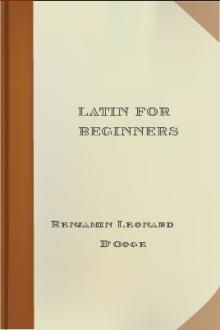Latin for Beginners by Benjamin Leonard D'Ooge (bill gates books recommendations txt) 📕

- Author: Benjamin Leonard D'Ooge
- Performer: -
Book online «Latin for Beginners by Benjamin Leonard D'Ooge (bill gates books recommendations txt) 📕». Author Benjamin Leonard D'Ooge
«512.» «Review Questions.» What is conjugation? Name two important differences between conjugation in Latin and in English. What is tense? What is mood? What are the Latin moods? When do we use the indicative mood? Name the six tenses of the indicative. What are personal endings? Name those you have had. Inflect sum in the three tenses you have learned. How many regular conjugations are there? How are they distinguished? How is the present stem found? What tenses are formed from the present stem? What is the tense sign of the imperfect? What is the meaning of the imperfect? What is the tense sign of the future in the first two conjugations? in the last two? Before what letters is a final long vowel of the stem shortened? What are the three possible translations of a present, as of pugnō? Inflect arō, sedeō, mittō, faciō, and veniō, in the present, imperfect, and future active. What forms of -iō verbs of the third conjugation are like audiō? what like regō? Give the rule for the dative with adjectives. Name the special intransitive verbs that govern the dative. What does the imperative mood express? How is the present active imperative formed in the singular? in the plural? What three verbs have a shortened present active imperative? Give the present active imperative of portō, dēleō, agō, faciō, mūniō.
IV. REVIEW OF LESSONS XXVII-XXXVI«513.» Give the English of the following words:
NOUNS OF THE FIRST DECLENSION «āla» «cūra» «mora» «porta» «prōvincia» «vīta»
NOUNS OF THE SECOND DECLENSION
«animus» «nāvigium»
aurum ōrāculum
«bracchium» «perīculum»
«deus» «ventus»
«locus» «vīnum»
mōnstrum
ADJECTIVES OF THE FIRST AND SECOND DECLENSIONS «adversus» «dubius» attentus «maximus» «cārus» perfidus «commōtus» «plēnus» «dēfessus» saevus «dexter» «sinister»
ADVERBS
«anteā» «ita»
«celeriter» «longē»
«dēnique» «semper»
«diū» «subitō»
«frūstrā» «tamen»
«graviter» «tum»
CONJUNCTIONS «autem» «sī» «ubi»
PREPOSITIONS «dē» «per» «prō» «sine»
VERBS
CONJ. I
«adpropinquō» «servō»
«nāvigō» «stō»
«occupō» «superō»
«postulō» «temptō»
«recūsō» «vāstō»
«reportō» «vulnerō»
CONJ. II «contineō» «egeō» «prohibeō» «respondeō» «teneō»
CONJ. III «discēdō» «gerō» «interficiō»
IRREGULAR VERB
«absum»
«514.» Translate the following words. Give the genitive and the gender of the nouns and the principal parts of the verbs.
be away heavily wind monster through approach if nevertheless savage place wound (verb) be without, lack wine moved delay gold faithless restrain, keep from right without seize hold quickly suddenly before, in behalf of dear battle always down from or concerning god moreover hold in, keep greatest afar oracle thus, so, as follows danger arm (noun) lay waste when gate in vain doubtful stand opposite, adverse bring back, win demand before, previously finally depart, go away attentive province then, at that time care, trouble weary kill overcome, conquer reply (verb) conquer wing boat, ship mind, heart sail (verb) left (adj.) life





Comments (0)